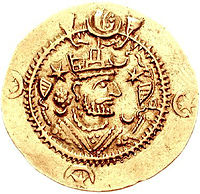Mazdak: The original Bolshevik
The roots of Bolshevism extend as deeply as the fifth century in Persia. Its exponent was a man named Mazdak, who was a Zoroastrian priest before he became a prophet. His doctrine taught that there were two original principles of the universe: Light, the force for good; and Darkness, the evil entity. These had been mixed by a cosmic accident, tainting everything except God. Light is characterised by knowledge and feeling, and acts by design and free will, whereas Darkness is ignorant and blind, and acts at random. Mankind's role in this life was, through good conduct, to release the parts of himself that belonged to Light.
| Mazdak |
Mazdak preached freedom of the variety desired by anarchists. He believed that without any laws, there were no criminals. His second revelation was that all men are born equal and have a right to maintain this equality through life. His third principle is that everything belongs to God and it is sinful to claim the property of God. A distinguishing factor of Mazdak's teaching was the reduction of the importance of religious formalities—the true religious person was the one who understood and related correctly to the principles of the universe. He also criticised the strong position of mainstream clergy, who, he believed, had oppressed the Persian population and caused much poverty.
Mazdak emphasised good conduct, which involved a moral and ascetic life, no killing and vegetarianism, being kind and friendly and living in peace with other people. In many ways Mazdak's teaching can be understood as a call for social revolution, and has been referred to as early ‘communism’ by many. He and his followers were also advocates of free love.
According to Mazdak, God had originally placed the means of subsistence on earth so that people should divide them among themselves equally, but the strong had coerced the weak, seeking domination and causing inequality. This in turn empowered the ‘Five Demons’ that turned men from Righteousness – these were Envy, Wrath, Vengeance, Need and Greed. To prevail over these evils, justice had to be restored and everybody should share excess possessions with his fellow men. Mazdak allegedly planned to achieve this by making all wealth common or by re-distributing the excess. Opposing sources to Mazdakism mostly dwell on the alleged "sharing" of women, or free love. the resulting sexual promiscuity and the confusion of the line of descent was regarded as heresy. Despite this accusation, it is likely that Mazdak took measures against the widespread polygamy of the rich and lack of wives for the poor.
Mazdak's teaching acquired many followers, to the point when even King Kavadh I, ruling from 488 until 531, converted to Mazdakism. With the King's backing Mazdak could embark on a program of social reform, which involved pacifism, anti-clericalism and aid programs for helping the poor. Mazdak had government warehouses opened to help the poor.
 |
| Coin depicting King Kavadh |
Comments
Post a Comment